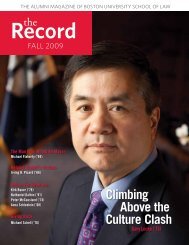the nature of representation: the cherokee right ... - Boston University
the nature of representation: the cherokee right ... - Boston University
the nature of representation: the cherokee right ... - Boston University
You also want an ePaper? Increase the reach of your titles
YUMPU automatically turns print PDFs into web optimized ePapers that Google loves.
148 PUBLIC INTEREST LAW JOURNAL [Vol. 15<br />
arguably includes <strong>the</strong> special treatment inherent in <strong>the</strong> <strong>right</strong> to select a special<br />
Cherokee delegate.<br />
The fact that three amendments were required to give all citizens <strong>the</strong> <strong>right</strong> to vote<br />
demonstrates that voting has and continues to be limited along a number <strong>of</strong> lines.<br />
Why is <strong>the</strong>re not a single Amendment in place <strong>of</strong> <strong>the</strong> Twenty-Sixth, 283 Nineteenth,<br />
and Fifteenth Amendments? It is because <strong>the</strong> U.S. continues to limit who has a<br />
<strong>right</strong> to vote; illegal aliens, permanent residents, and some criminals cannot vote.<br />
The separate development <strong>of</strong> voter protections and <strong>the</strong> exclusion <strong>of</strong> some people<br />
within <strong>the</strong> U.S. from elections suggest that <strong>the</strong> Constitution does permit<br />
politically-based distinctions between those allowed and those not allowed to<br />
participate in elections. As a political ra<strong>the</strong>r than racial group per Mancari,<br />
Cherokees perhaps fit within a new allowable political distinction.<br />
The preceding paragraphs present a Constitutionally based argument that <strong>the</strong><br />
Cherokees could make in favor <strong>of</strong> special treatment with respect to voting <strong>right</strong>s.<br />
However, <strong>the</strong> Cherokees will have to distinguish Rice v. Cayetano 284 if <strong>the</strong>y are to<br />
assert successfully that <strong>the</strong> delegate <strong>right</strong> would not infringe upon <strong>the</strong><br />
Constitutional voting and <strong>representation</strong>al <strong>right</strong>s <strong>of</strong> non-Cherokees. 285<br />
In Rice v.<br />
Cayetano, <strong>the</strong> Supreme Court considered whe<strong>the</strong>r a Hawaii state constitutional<br />
provision that limited <strong>the</strong> <strong>right</strong> to vote for <strong>the</strong> trustees <strong>of</strong> <strong>the</strong> Office <strong>of</strong> Hawaiian<br />
Affairs to Native Hawaiians violated <strong>the</strong> Fifteenth Amendment. 286 The Court ruled<br />
that such a limitation on who could vote was unconstitutional. 287 The Court found<br />
<strong>the</strong> Fifteenth Amendment controlling and explained that “[t]he design <strong>of</strong> <strong>the</strong><br />
Amendment is to reaffirm <strong>the</strong> equality <strong>of</strong> races at <strong>the</strong> most basic level <strong>of</strong> <strong>the</strong><br />
democratic process, <strong>the</strong> exercise <strong>of</strong> <strong>the</strong> voting franchise.” 288<br />
“Ancestry can be a<br />
proxy for race,” <strong>the</strong> Court continued, and as far as Native Hawaiians were<br />
concerned, <strong>the</strong> Court found this to be true; consequently, <strong>the</strong>ir special voting <strong>right</strong>s<br />
were held unconstitutional. 289<br />
In Rice v. Cayetano, <strong>the</strong> Court explicitly rejected <strong>the</strong> idea that Mancari’s<br />
283<br />
The Twenty-Sixth Amendment states, in relevant part: “The <strong>right</strong> <strong>of</strong> citizens <strong>of</strong> <strong>the</strong><br />
United States, who are eighteen years <strong>of</strong> age or older, to vote, shall not be denied or<br />
abridged....”U.S.CONST.amend.XXVI§1.<br />
284<br />
528 U.S. 495 (2000).<br />
285<br />
The discussion in <strong>the</strong> remainder <strong>of</strong> this section benefited in part from <strong>the</strong> ideas and<br />
presentation <strong>of</strong> <strong>the</strong> law found in two papers written by Pr<strong>of</strong>essor Viet Dinh: Viet Dinh<br />
& H. Christopher Bartolomucci, The Authority <strong>of</strong> Congress to Establish a Process for<br />
Recognizing a Reconstituted Native Hawaiian Governing Entity, Prepared for Office<br />
<strong>of</strong> Hawaiian Affairs, State <strong>of</strong> Hawaii, May 16, 2005 (on file with <strong>the</strong> author); Viet<br />
Dinh & Adam H. Charnes, The Authority <strong>of</strong> Congress to Enact Legislation to Provide<br />
<strong>the</strong> District <strong>of</strong> Columbia with Voting Representation in <strong>the</strong> House <strong>of</strong> Representatives,<br />
(Nov. 2004), http://www.dcvote.org/pdfs/congress/vietdinh112004.pdf.<br />
286<br />
528 U.S. 495 (2000).<br />
287<br />
Id.<br />
288<br />
Id. at 512.<br />
289<br />
Id. at 514.









